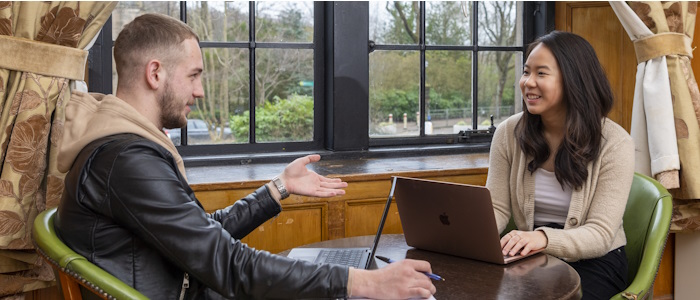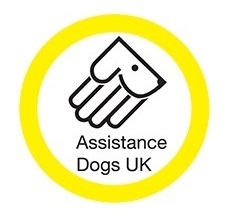Disability
The University of Glasgow is committed to disability equality and ensuring all staff, students and visitors have a positive experience of the work, learning, teaching and research environment. The University provides a wide range of specialist support, provision and guidance for staff with disabilities and as well as those staff supporting both disabled students and colleagues.

Supporting Disabled and Neurodivergent Colleagues and Prospective Employees
Support for existing colleagues
The University aims to maintain a people-centred and inclusive working environment where colleagues feel valued and supported and can enjoy a fulfilling career.
Our portal has been designed to support disabled and neurodivergent colleagues and their managers to discuss, explore and implement reasonable adjustments in order to remove or overcome barriers in the workplace. Colleagues who wish to view all resources on one page/list view may prefer the ‘Toolkit View’.
In addition, the Government's Access to Work can help you if your health or disability affects the way you do your job. Accessed through an online application process, you need to apply as an individual.
Line Managers should undertake the mandatory Implementing Reasonable Adjustments course. The course will equip you with a practical understanding of what the law means when it talks about “disability” and “reasonable adjustments”. And it gives everyone clear guidance on how to identify and implement reasonable adjustments effectively.
Line Managers can also learn how to recognise the signs of workplace stress and to support their staff by accessing the Mentally Healthy Workplace online course.
Line Managers can download Disability Confident - A Practical Guide for Line Manager.
Supporting your disabled colleagues
Our Anticipatory Duty
The Equality Act states we have an anticipatory duty to disabled people. This means we must anticipate the needs of disabled people and make appropriate reasonable adjustments. So what can you do?
Practical things to do
- All staff can undertake the Implementing Reasonable Adjustments course. The course will equip you with a practical understanding of what the law means when it talks about “disability” and “reasonable adjustments”. And it gives everyone clear guidance on how to identify and implement reasonable adjustments effectively.
- Read the SRC's Language and Disability Guide.
- Check out Creating a dyslexia friendly workplace.
- Ensure any documents you produce for colleagues/students are fully accessible in the first instance, rather than waiting to be asked for an accessible version afterwards. Check out the Digital Accessibility guidance on how to make various different document formats more accessible.
- Read Research and Innovation Services information on Accessiblity and Inclusivity and watch their guide to Embedding Equality and Diversity in University-funded Conferences and Events.
- Make sure all meetings you are hosting/setting up are accessible to all. Always ask your attendees to let you know if they require have any specific accessibility requirements. Always issue meeting papers/presentations in advance (ensuring your documents are also accessible), to ensure people have the opportunity to digest their contents in advance.
- In-person meetings: Think about the venue - is it accessible? Is there space around the table for a wheelchair user to join the meeting comfortably? If a screen is to be used to present, can someone with visual impairments see it OK? You may need to allocate a seat specifically for them. Someone with a hearing impairment may ask to sit in the middle of the group to ensure they can see/hear everyone else. If an attendee has a hearing impairment or is a BSL user, there are other considerations which need to be put in place well in advance of the meeting such as booking a BSL interpreter or a live captioner so they can fully participate in the meeting discussions. However, don't assume what they need - always ask the attendee what works best for them.
- On-line meetings: You will need to take other things into consideration for online meetings. Read the Learning and Teaching Committee approved Online Meeting Guidance (L&TC). You will also need to consider how to ensure those with hearing impairments can fully participate. Read the detailed guidance put together by Kirsteen Allison on Accessibility for Deaf/Hearing Impaired participants at Online Meetings & Events.
Thinking of applying for a job at the University?
Find out about how the University can assist you when applying for a job at the dedicated 'Jobs at Glasgow' page.
Supporting your Disabled Students
The University has a number of resources to ensure our staff have the information and guidance to be able to support their Disabled student to achieve their full potential.
- Implementing Reasonable Adjustments for Students (Moodle e-learning course designed for all staff working with disabled students)
- Digital Accessibility Guidance
- Accessibility for Deaf/Hearing Impaired participants at Online Meetings & Events
- Learning and Teaching Committee approved Online Meeting Guidance (L&TC)
- Dyslexia friendly style guide
- Disability Service - Information for Staff Supporting Disabled Students
- Academic & Digital Development
- Accessible & Inclusive Learning Policy
- Various Student Support Policies (housed on Senate Office webpages)
- British Sign Language Dictionary - online collection of thousands of words and phrases in British Sign Language (BSL).
Neurodiversity Resource Hub
The Neurodiversity Resource Hub was created as a part of a Wellcome Trust ISSF project by the School of Cancer Sciences and the School of Biodiversity, One Health & Veterinary Medicine, part of the College of Medical, Veterinary & Life Sciences, to embrace neurodiversity and support neurodivergent staff and Postgraduate Research (PGR) students, but the resources will be useful for all.
The hub includes information on neurodiversity terminology; inclusive and accessible practices; support for neurodivergent staff and PGR students; and navigating working relationships including that of supervisor and PGR student.
All materials included within the hub are by experts in the field of neurodiversity and disability equality or from the University of Glasgow’s own materials.
Assisted Evacuation
Need assistance to evacuate during an emergency? Information on the arrangements in place can be found on Safety & Environmental Protection Services.
Assistance Dogs
Assistance Dogs are welcome across the University. Look out for the logo. You'll find the dog toilet area to the side of the main Library entrance.

Assistance dogs - a guide for businesses
Please review the University's Animlas on Campus guidance.
University Accessibility Information
Find out what support is available to get around campus; which rooms have hearing assistance equipment fitted; what to do if you have an issue and who to report it to; what to do in an emergency; and how the University actively consults with students and staff on accessibility issues on the University's Accessibility page.
Out of Order Lifts
The University has a number of buildings that contain lifts for access purposes. On occasion these lifts breakdown or require to be taken out of service for maintenance purposes. As such, the University has set up an email distribution list ensure staff, who require the use of these lifts, are notified of any lifts which are affected in this way.
If you are a staff member and wish to be added to this email distribution list please email the Equality and Diversity Unit on equality@glasgow.ac.uk with 'Out of Order Lift Distribution List' in the subject line. You can opt in and out at any time. Please review the relevant Privacy Notice - Out of Order Lifts.
AccessAble - access guides
AccessAble provide an online description of the physical access features of over 100 university services and buildings across all three of our campuses, including:
- the Hunterian Museum
- Sports and Recreation Service
- Library
- various accommodation sites.
Disability Equality Group
The University's Disability Equality Group is chaired by the University’s Disabilty Equality Champion and has student, staff and relevant University Service representation. The group acts as a channel of communication where issues affecting disabled people can be raised and addressed or referred to appropriate bodies for action.
Disability Confident Employer
The University of Glasgow is a Disability Confident Employer.
DWP Disability Confident video
Disability Confident is a government scheme designed to encourage employers to recruit and retain disabled people and those with health conditions.
The Disability Confident scheme has taken over from the previous Two Ticks Positive about Disabled People scheme. Our Disability Confident Employer status was awarded in January 2017.
The University of Glasgow originally gained Two Ticks accreditation in 2008, and Disability Confident broadens and deepens our existing commitment as an employer.
Policies and Plans
View the University’s current Equality and Diversity Policy & related Disability Appendix.
View the University's Accessible Events Policy
Accessible & Inclusive Learning Policy.
View the University's British Sign Language (BSL) Action Plan


